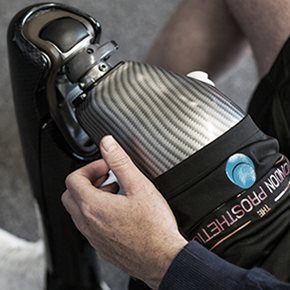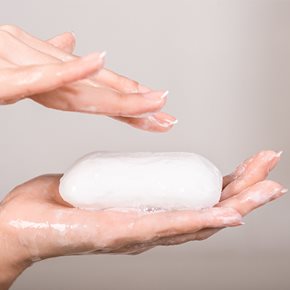Patient Advice During Self-Isolation and Social-Distancing
During this unprecedented time, here at The London Prosthetic Centre we are continuously reviewing how we provide care to our patients during the Covid-19 pandemic, whilst ensuring we protect our employees as well as our surrounding community.
Looking after your physical and psychological wellbeing is of vital importance during this time, which is why we have compiled this advice and these resources for our patients.

 Looking after your prosthesis/orthosis
Looking after your prosthesis/orthosis
As a result of the escalating situation, The London Prosthetic Centre has had to take the necessary precautions to protect staff and patients. This may mean a reduced number of appointments, including emergency appointments, as well as looking to use telephone or video-call appointments as an alternative.
Therefore it is important to look after your prescribed prosthesis during this time. Avoid undertaking any activities at home which may damage your device, and if it does become damaged – please do not attempt to modify your device. If your device does become damaged, please contact The London Prosthetic Centre for advice on what to do next.
It is however important that you maintain your prescribed usage of your device, as significantly reducing your wear time could impact on your rehabilitation and recovery. Continue to follow the advice given to you by your clinician, unless advised otherwise, and refer to the User Care Information for your device for guidance on cleaning and care.
For the correct care and usage of a prosthetic device, we recommend contacting your prosthetist for updated advice. You can also view our frequently asked questions here:
Amputee FAQ's
If you have any queries regarding future appointments, please contact
The London Prosthetic Centre online for updates regarding ourr service.
Keeping active
Keeping your body moving is pivotal at this time, as this current period of social-distancing/self-isolation is constantly under review. As an amputee, retaining or building muscle strength, balance and range of motion will help you to utilise your current device effectively.
Whilst gym and leisure facilities are no longer open, it is important to carry out any mobility exercises prescribed by your physiotherapist/occupational therapist where possible within your home or garden. However please ensure you are carrying these out in a suitable environment, refrain from using furniture/household objects as an alternative for gym equipment, and do not endanger yourself or other during the process.
A particularly useful resource is the toolkit of exercise videos Limb Power have on their website:
https://limbpower.com/exercise/toolkit-videos.
Please ensure you check with your prosthetist before carrying out any of these exercises.

 Caring for your affected limb
Caring for your affected limb
As a prosthetic patient, maintaining the health of your affected limb is key, particularly during the current situation as prosthetic services have been scaled back to protect patients and staff.
In particular, amputees should pay close attention and use best practice when caring for their residual limb health.
Any major changes in your body weight, activity level or lifestyle may affect the function of your prosthesis and your comfort. Examination and care of your residual limb should become part of your daily routine.
Download this quick reference sheet for daily residual limb care.
By looking after your affected limb health, you reduce the risk of infection and can spot any early warning signs of an issue.
Patients diagnosed with diabetes
If you have been diagnosed with Type 1 or Type 2 diabetes, it is especially important to maintain a healthy and active lifestyle during this time. Although at no greater risk of contracting the virus, if contracted you may be at risk of developing more severe symptoms.
For the latest information regarding diabetes and Coronavirus, Diabetes UK regularly update their website with updates, and support for those looking for guidance or reassurance:
https://www.diabetes.co.uk/
For more information on Diabetes in general, please visit the NHS website:
https://www.nhs.uk/conditions/diabetes/

 Looking after your wellbeing
Looking after your wellbeing
During unprecedented situations such as this, it is more important than ever to ensure you are looking after your own emotional wellbeing. With daily routines and social lives being heavily disrupted and long periods indoors, this may have a detrimental impact on your mental health. However there is a wealth of information and guidance online on how to adjust your outlook, and tips on creating a daily routine which will keep you motivated and positive.
A good start is by reading this feature by the Mental Health Foundation on what you, a family member or a friend may be experiencing, and explore the resources they have available on their website:
https://www.mentalhealth.org.uk/publications/looking-after-your-mental-health-during-coronavirus-outbreak
The NHS have also put together an action list on combating anxiety when having to stay at home, which includes videos on combating negative thoughts, mindful breathing and learning resources:
https://www.nhs.uk/oneyou/every-mind-matters/coronavirus-covid-19-staying-at-home-tips/
Let us be there for you
We understand that you may have a lot of questions during this time about your treatment and future appointments, therefore we recommend contacting The London Prosthetic Centre via email for updates on current services. We will endeavour to get back to you as soon as possible, however please note that due to changes in work patterns response times may be slightly longer than usual.